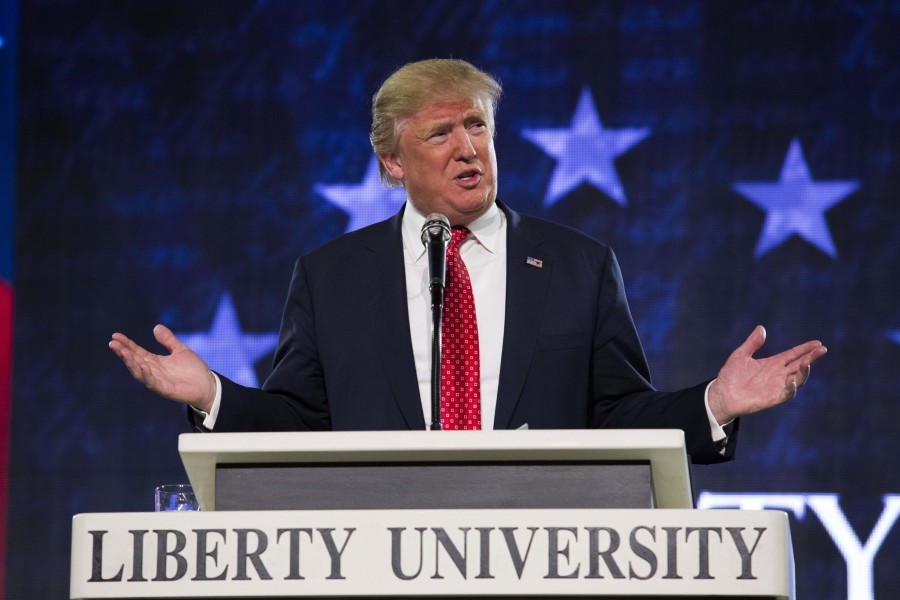Donald Trump addressed a mandatory convocation at Liberty University this week, and the internet has been abuzz. The “big news”? Trump said “Two Corinthians” instead of “Second Corinthians”, seemingly revealing his true biblical illiteracy. Little attention has been paid, at least as far as Twitter is concerned, about the content of his quotation, or the use of the Bible itself. It would seem that if Trump had nailed the rhetoric he would have passed the test. Nomenclature trumps accuracy. Trump was quoting 2 Corinthians 3.17, the institutional verse of Liberty University.
Now the Lord is the Spirit, and where the Spirit of the Lord is there is liberty.
Trump offers this insightful commentary:
That’s the whole ballgame. ‘Where the Spirit of the Lord is, there is liberty.’ Here there is Liberty College. Liberty University but it is so true. Is that the one you like. I think it is. I love it. And it is so representative of what is taking place.
2 Corinthians 3.17 seems to be a fitting one-liner for labeling an institution: “Liberty.”
In context, however, Paul isn’t talking about an institution, even a church, but rather the New Covenant. When a person turns to the Lord (2 Cor. 3.16), the veil of separation is removed and, with unveiled face (2 Cor. 3.18) one may gaze upon the glory of God. Fascinatingly Paul compare this to looking in a mirror. This is possible because the one who looks upon God is “being transformed into the same image.” The term for image here is the same as that found all the way back in Genesis 1.26-27. In the Greek, εἰκών: image, likeness, or even idol. Man and Woman were originally made in the image of God.
Those who are members of the New Covenant now gaze on God’s glory, Paul says, and see that the image of God which sets humanity apart from all creation is being restored. The image of God.
Interestingly enough, the word “image” comes up in another passage cited during the Liberty convocation, this time by Jerry Falwell Jr., Liberty’s president. Falwell (at 8:50) makes an offhand reference to Matthew 22.21,
When Jesus said, ‘Render to Caesar the things that are Caesar’s…’ that meant we are to be good citizens: voting, active in the political process, serving in the armed forces if necessary.
Late last year he made reference to the same passage in a December 5th, 2015 article on his advocacy of arming Liberty students. Apparently this particular interpretation was near and dear to his late father as well.
What is fascinating about this, is the Matthew 22 passage uses some of the same key terms as 2 Corinthians. Some Pharisees and aristocrats, we are told, set a trap for Jesus. They ask him, “Is it lawful to pay taxes to Caesar?” A dangerous question! Pay the tax and risk the accusation of colluding with the enemy, refuse to pay the tax and end up on a cross. Jesus’ reply is to first ask for a denarius, the coin used for the tax.

Denarius with image of Tiberius
‘Whose image (εἰκών) is this?’, Jesus asks (Matt. 22.20).
‘Caesar’s’, they reply.
Jesus answers, ‘Then render to Caesar the things that are Caesar’s, and to God the things that are God’s.’
This is not a parable. The tax is a tax, the coin is a coin, Caesar is Caesar. These are not symbols of something else. The image on the coin is that of Tiberius Caesar, and because it is his image, according to Jesus, it is his coin.
Whatever bears the image of Caesar is Caesar’s, and whatever bears the image of God belongs to God.
Caesar can keep the coins which bear his εἰκών, his image, his idol. Pay your taxes. But that which bears God’s image belongs to him alone. The person, the human being, can belong to God alone and is to be offered to him alone. So, using Matthew 22.15-22 as some sort of justification of the Christian’s participation in secular governments, fighting their wars, is not only a serious mis-reading, it is a counter-reading.
Words like idolatry and blasphemy, while extreme, are nonetheless appropriate.
If this is the scriptural warrant for the type of political action advocated by Christians we can expect disastrous results. To return to 2 Corinthians 3.17: those who bear the image of God experience true liberty by the Spirit. This liberty has not been procured by the American (or any!) political process, nor is it secured by political violence and power. It cannot be protected or fought over with concealed or unconcealed weapons, whether wielded by private citizens or professional soldiers. It can’t be won, lost, or compromised with a vote. It is the irrevocable gift of those who turn to the Lord (2 Cor. 3.16). In Trump’s words, though I doubt very much he knows anything about this passage, this is “the whole ballgame.”
So when we look in the mirror whose image is staring back? God or Caesar? The answer to that question will determine a great deal.





Leave a Reply
Your email is safe with us.